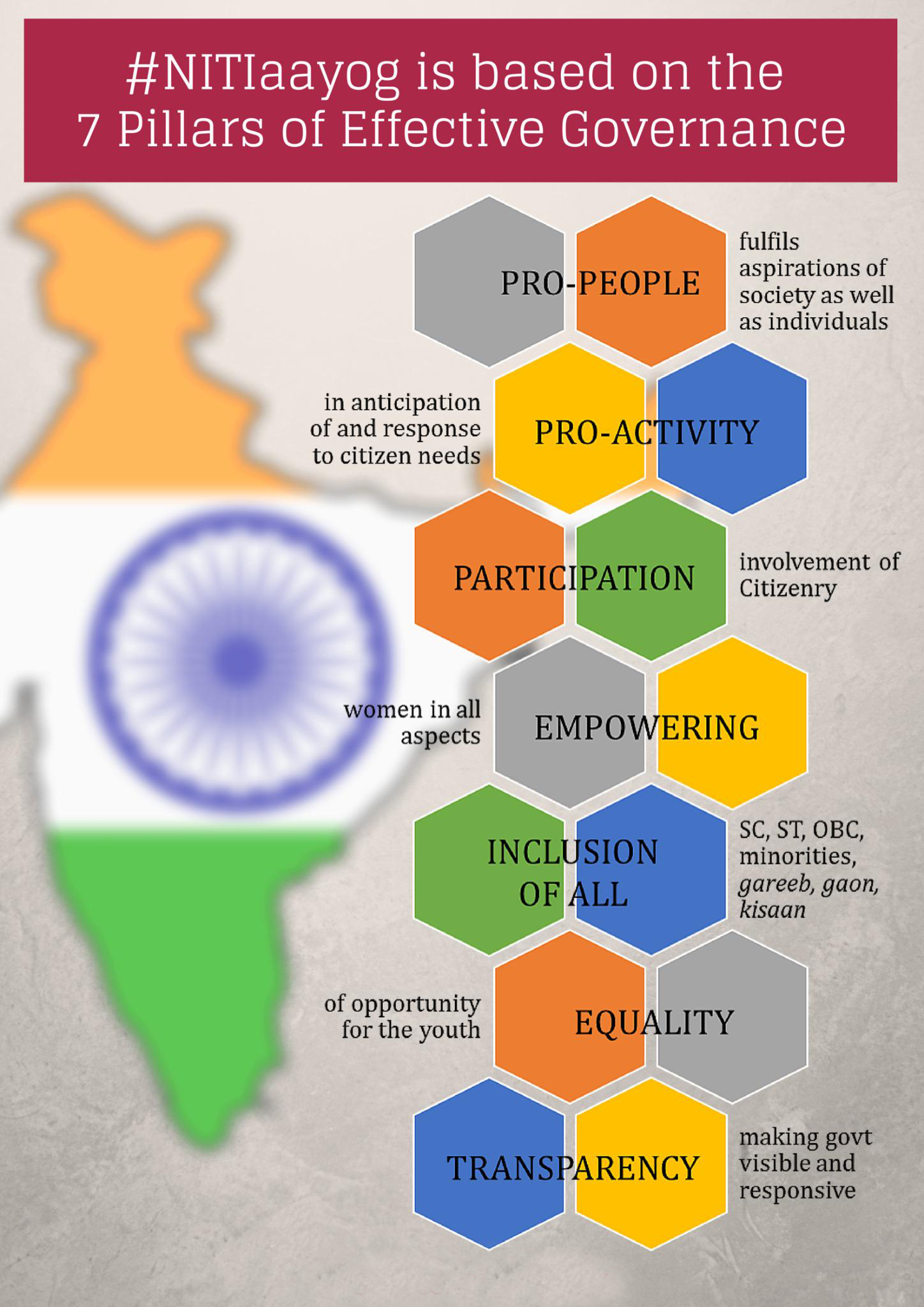Indian Polity
NITI Aayog
- 25 Jun 2022
- 7 min read
For Prelims: NITI Aayog
For Mains: NITI Aayog, Significance and Concerns
Why in News?
NITI (National Institution for Transforming India) Aayog CEO Amitabh Kant is set to leave and will be replaced by former Secretary of the Ministry of Drinking Water and Sanitation - Parameswaran Iyer.
What is NITI Aayog?
- Background:
- Planning Commission was replaced by a new institution – NITI Aayog on 1st January, 2015 with emphasis on ‘Bottom –Up’ approach to envisage the vision of Maximum Governance, Minimum Government, echoing the spirit of ‘Cooperative Federalism’.
- It has two Hubs.
- Team India Hub acts as interface between States and Centre.
- Knowledge and Innovation Hub builds the think-tank acumen of NITI Aayog.
- Composition:
- Chairperson: Prime minister
- Vice-Chairperson: To be appointed by Prime-Minister
- Governing Council: Chief Ministers of all states and Lt. Governors of Union Territories.
- Regional Council: To address specific regional issues, Comprising Chief Minister and Lt. Governors Chaired by the Prime Minister or his nominee.
- Ad-hoc Membership: Two members in ex-officio capacity from leading Research institutions on a rotational.
- Ex-Officio membership: Maximum four from the Union council of ministers to be nominated by the Prime Minister.
- Chief Executive Officer: Appointed by the Prime-minister for a fixed tenure, in the rank of Secretary to Government of India.
- Special Invitees: Experts, Specialists with domain knowledge nominated by the Prime Minister.
- Objectives:
- To foster cooperative federalism through structured support initiatives and mechanisms with the States on a continuous basis, recognizing that strong States make a strong nation.
- To develop mechanisms to formulate credible plans at the village level and aggregate these progressively at higher levels of government.
- To ensure, on areas that are specifically referred to it, that the interests of national security are incorporated in economic strategy and policy.
- To pay special attention to the sections of our society that may be at risk of not benefiting adequately from economic progress.
- To provide advice and encourage partnerships between key stakeholders and national and international like-minded Think Tanks, as well as educational and policy research institutions.
- To create a knowledge, innovation and entrepreneurial support system through a collaborative community of national and international experts, practitioners and other partners.
- To offer a platform for resolution of inter-sectoral and inter-departmental issues in order to accelerate the implementation of the development agenda.
- To maintain a state-of-the-art Resource Centre, be a repository of research on good governance and best practices in sustainable and equitable development as well as help their dissemination to stakeholders.
| NITI Aayog | Planning Commission |
| It serves as an advisory Think Tank. | It served as extra-constitutional body. |
| It draws membership from a wider expertise. | It had limited expertise. |
| It serves in spirit of Cooperative Federalism as states are equal partners. | States participated as spectators in annual plan meetings. |
| Secretaries to be known as CEO appointed by Prime- Minister. | Secretaries were appointed through usual process. |
| It focuses upon ‘Bottom-Up’ approach of Planning. | It followed a ‘Top-Down’ approach. |
| It does not possess mandate to impose policies. | Imposed policies on states and tied allocation of funds with projects it approved. |
| It does not have powers to allocate funds, which are vested in Finance Minister. | It had powers to allocate funds to ministries and state governments. |
Why is the Creation of NITI Aayog is Significant?
- The 65 year-old Planning Commission had become a redundant organization. It was relevant in a command economy structure, but not any longer.
- India is a diversified country and its states are in various phases of economic development along with their own strengths and weaknesses.
- In this context, a ‘one size fits all’ approach to economic planning is obsolete. It cannot make India competitive in today’s global economy.
What are the Related Concerns and Challenges?
- NITI Aayog has no powers in granting discretionary funds to states, which renders it toothless to undertake a transformational intervention.
- It acts as an advisory body only that advises the government on various issues without ensuring the enforceability of its ideas.
- NITI Aayog has no role in influencing private or public investment.
- Politicization of the organization has been in recent times.
- NITI Aayog has been transformed into a glorified recommendatory body which lacks the requisite power to bring positive change in the government’s actions.
What are the Initiatives of NITI Aayog?
- SDG India Index
- Composite Water Management Index
- Atal Innovation Mission
- SATH Project.
- Aspirational District Programme
- School Education Quality Index
- District Hospital Index
- Health Index
- Agriculture Marketing And Farmer Friendly reform Index
- India Innovation Index
- Women Transforming India Awards
- Good Governance Index
Way Forward
- Equipping the planning body with requisite powers so that it can effect change.
- Allocation of adequate resources is needed.
- It can be made legally accountable to the legislature for its inability to meet the targets. This would bring in more accountability.
- Ensure the planning body remains a non-partisan institution.
- Bureaucratic inertia need to be shaken, specializing it and fixing the accountability on basis of performance.







